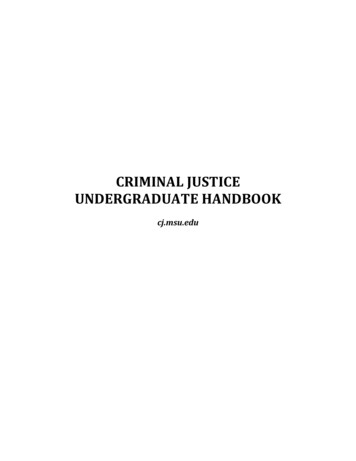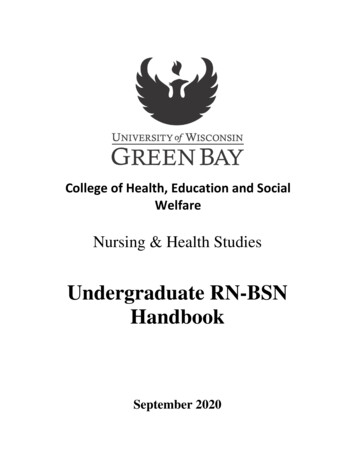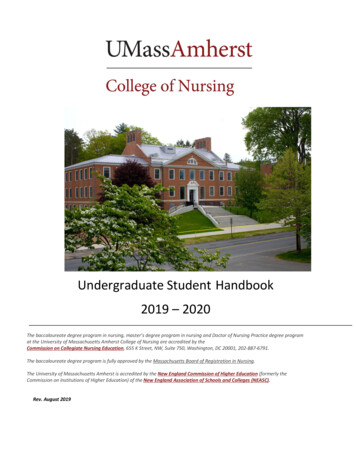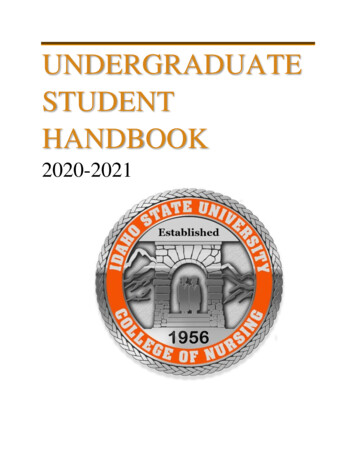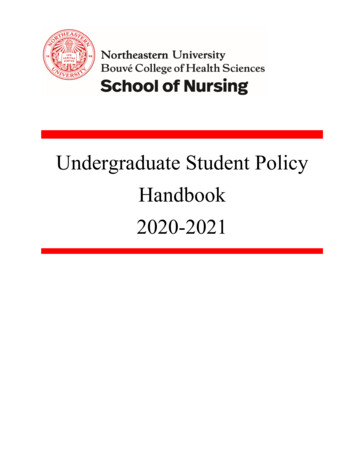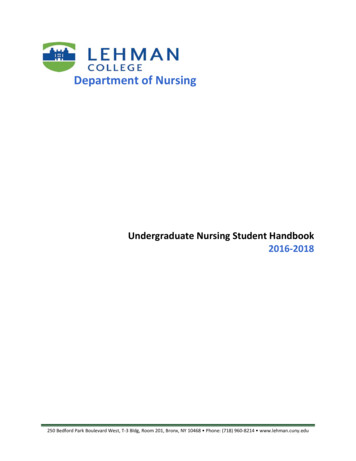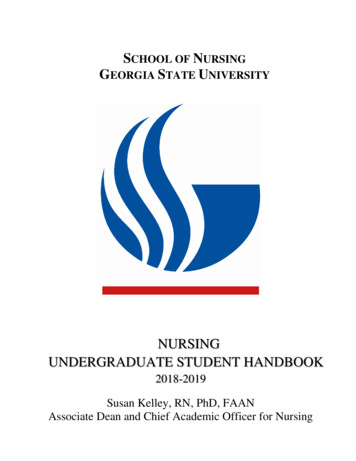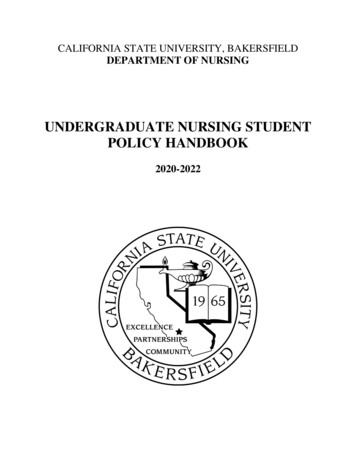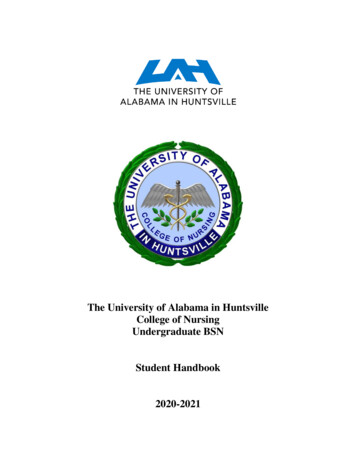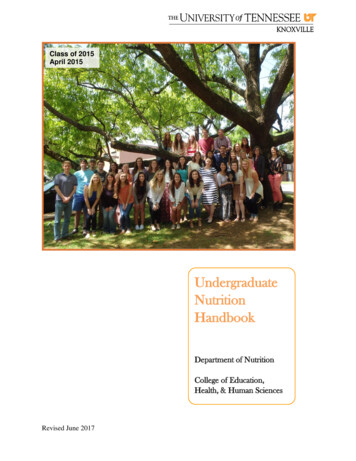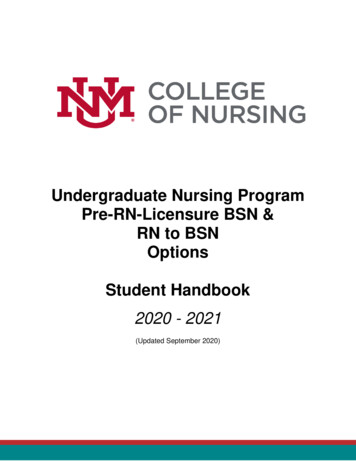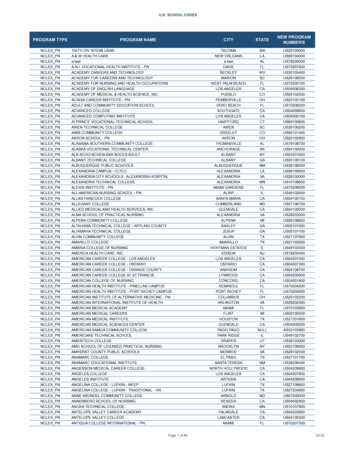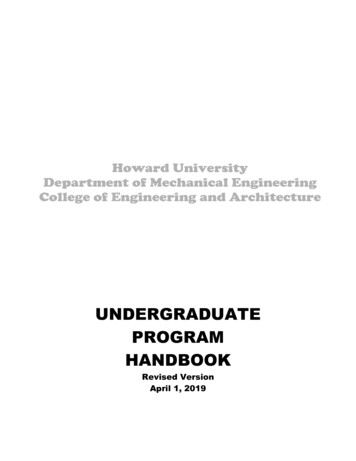
Transcription
UNDERGRADUATEPROGRAMHANDBOOKRevised VersionApril 1, 2019
UNDERGRADUATE PROGRAM HANDBOOKDEPARTMENT OF MECHANICAL ENGINEERINGCOLLEGE OF ENGINEERING AND ARCHITECTUREHOWARD UNIVERSITYWASHINGTON, DC 20059Revised April 1, 2019ii
From the Department.Welcome to Howard University and the Department of Mechanical Engineering. I am pleased thatyou chose to enroll and work towards a Bachelor of Science degree in mechanical engineering.Our undergraduate program in mechanical engineering is accredited by The Accreditation Boardfor Engineering and Technology (ABET). You should know that the department also offers theMaster of Engineering and PhD degrees and you are encouraged to set your academic goals highenough to obtain advanced degrees in mechanical engineering.Over the years, the department has produced a large number of outstanding graduates who havecontinued to excel in their chosen fields of work. Our graduates work with engineers andprofessionals from other disciplines to provide the fuel that drives this nation’s industries andgovernment operations. They are also employed as leaders in academic institutions and othervaried professions in the United States and across the world. With a good preparation in thefundamentals of mechanical engineering you should be in a position to take full advantage of theopportunities available in technology and enjoy a fascinating and rewarding career.You will find in this Handbook a listing of courses designed for a four-year curriculum and a fewother resources that you should find very useful. This Handbook does not provide a complete guideto information you need for your day-to-day stay here at Howard. You should consult otheruniversity and college publications such as the H-Book, The Student Reference Manual andDirectory of Classes or other university publications that may become available in print or on line at theHoward University web site for additional detailed information. You will be assigned an academicadvisor shortly after registration and you should make a point to visit with your advisor from timeto time for academic matters relating to your courses and career objectives. You should feel freeto visit the Office of the Department of Mechanical Engineering in Room 2032 LKD Building,and the Office of Student Services in Room 1114 LKD Building and acquaint yourself with otheracademic and non-academic resources that are available in the College. Many other resources thatare available at the University are described in the H-Book.The Department of Mechanical Engineering faculty and staff are committed to continuousimprovements of our programs and we encourage your questions and comments on all aspects ofour programs. We are particularly interested in your comments regarding program educationalobjectives, learning outcomes and the curriculum.Again, welcome to the Mechanical Engineering Department and we invite your questions andcomments.iii
TABLE OF CONTENTSVISION .1MISSION .1UNDERGRADUATE PROGRAM EDUCATIONAL OBJECTIVES .1UNDERGRADUATE PROGRAM LEARNING OUTCOMES .1ACADEMIC POLICIES, HONORS AND DEGREE REQUIREMENTS.2FACULTY ADVISORS . 2TRANSFER CREDIT . 2CONSORTIUM COURSES. 3DEAN'S HONOR ROLL . 3ATTENDANCE REGULATIONS . 3ACADEMIC SUSPENSION AND READMISSION . 3GRADUATION . 3DEGREE REQUIREMENTS . 4ACCREDITATION REQUIREMENTS REGARDING COURSE PREREQUISITES . 4SOCIAL SCIENCE AND HUMANITIES ELECTIVES . 4Table 1: Humanities Elective Options .5Table 2: Social Science Elective Options .6Table 3: University's African-American Course Options .7MECHANICAL ENGINEERING CURRICULUM .8FRESHMAN . 8SOPHOMORE . 8JUNIOR . 8SENIOR . 8PREREQUISITES AND CO-REQUISITES . 9TECHNICAL OPTIONS . 12Design & Manufacturing . 12Energy. 12Applied Mechanics/Aerospace. 12FREE ELECTIVE. 13ACADEMIC PROGRESS CHECKSHEET. 14FACULTY & STAFF DIRECTORY . 15DEPARTMENT BULLETIN BOARD . 16STUDENT ORGANIZATIONS . 16OFFICE OF STUDENT SERVICES . 16NOTES: . 16ASME CODE OF ETHICS OF ENGINEERS . 17iv
MECHANICAL ENGINEERING DEPARTMENTVISIONTo be a leading program in providing undergraduate and graduate mechanical engineeringeducation and to graduate outstanding engineers that are prepared to assume leadership roles ingovernment, industry and academia.MISSIONThe mission of the department is to provide mechanical engineering majors a high-quality engineeringeducation and to contribute new knowledge through research in mechanical engineering and allieddisciplines. In addition, the department seeks to maintain recognition through scholarly work and serviceto the college, the university and the external community.To achieve the mission of the department of mechanical engineering, the faculty of the department, withinput from other constituents, established the following Undergraduate Program Educational Objectives:UNDERGRADUATE PROGRAM EDUCATIONAL OBJECTIVESThe Mechanical Engineering Undergraduate Program Educational Objectives (PEOs) are that ourgraduates:I. Establish careers in mechanical engineering or a related fieldII. Successfully complete graduate school and/or obtain professional registrationIII. Effectively lead other engineers in solving technical problems and developing products sought bylocal and/or the global communityUNDERGRADUATE PROGRAM LEARNING OUTCOMESGraduates of the Mechanical Engineering Program at Howard University have:(a) an ability to apply knowledge of mathematics, science, and engineering(b) an ability to design and conduct experiments, as well as to analyze and interpret data(c) an ability to design a system, component or process to meet desired needs within realistic constraintssuch as economic, environmental, social, political, ethical, health and safety, manufacturability, andsustainability(d) an ability to function on multi-disciplinary teams(e) an ability to identify, formulate, and solve engineering problems(f) an understanding of professional and ethical responsibility(g) an ability to communicate effectively(h) the broad education necessary to understand the impact of engineering solutions in a global, economic,environmental, and societal context(i) a recognition of the need for, and an ability to engage in life-long learning(j) a knowledge of contemporary issues(k) an ability to use the techniques, skills, and modern engineering tools necessary for engineering practice1
ACADEMIC POLICIES, HONORS AND DEGREE REQUIREMENTSThis information has been prepared as a convenience for undergraduate Mechanical Engineeringstudents and their faculty advisors. It is not intended to replace official university publications suchas the Student Reference Manual1 published by the Office of Enrollment Management, nor the HBook2, which serves as a general resource for all Howard University students, and is published bythe Office of Student Affairs. Students and their faculty advisors are encouraged to become familiarwith information contained in these documents and other university publications that may becomeavailable in print form or on the Howard University web site3Student Reference Manuel, ult.htm # Student Reference Manual, AccessedAugust 1, 20172 Howard University Student Handbook, http://www.howard.edu/students/hbook/H-book.pdf, Accessed August 1, 20173 http://www.howard.edu1Faculty AdvisorsStudents in the Department of Mechanical Engineering are assigned a faculty advisor at thebeginning of their first semester in residence. Students should consult on a regular basis with theirfaculty advisor on all academic matters and career objectives. Continuing students must report totheir faculty advisor to plan their program of study prior to the general registration period. Afterthe student and advisor plan a program of study, the advisor will issue a Personal InformationNumber (PIN) that allows the student to register via the Bison Web. A new PIN will be issued eachsemester.Advanced Placement (AP) CreditStudents entering college for the first time may receive credit for work completed in high(secondary) school through the advanced placement program administered by the College Board.Upon submission of AP test results, the Department will review and grant credit if the score meetsthe requirements set by the appropriate Howard University department offering a similar course.Transfer CreditTransfer credit is awarded to students who are admitted as transfer students from an accreditedinstitution after review of official transcripts from all of the student's previous institutions by theDepartment of Mechanical Engineering. Courses for which transfer credit is given must beequivalent to Howard University courses in content, prerequisites, co-requisites, and credit hours.No credit will be transferred for courses that do not meet the prerequisites of courses in themechanical engineering curriculum at Howard University. Only courses in which a grade of "C" orbetter was obtained at an accredited institution are transferable. Credits for some courses offeredby the College of Arts and Sciences are transferable from international institutions if those courseshave been evaluated by the University and are considered equivalent to courses offered at HowardUniversity. To apply for transfer credit, the student must provide official course descriptions andother supporting documentation, i.e. a current University Catalog from all institutions in whichtransfer credit is requested. Applications for transfer credit may be obtained from the office of theDepartment of Mechanical Engineering.2
Consortium CoursesHoward University offers it’s qualified undergraduate and graduate degree students the opportunityto enroll in courses in the Washington Metropolitan Area Consortium of Universities (WMACU).Courses to be pursued through the Consortium must be courses not available at Howard Universityduring the given semester or year. Detailed eligibility requirements for enrolling in consortiumcourses are contained in the Howard University Student Reference Manual published eachsemester.Dean's Honor RollStudents with a grade point average of at least 3.0 based on a minimum load of 14 creditsfor the semester will have their names placed on the Dean's Honor Roll.Attendance RegulationsAll students are expected to attend classes regularly and promptly. Students who are absentfrom classes or laboratory periods are responsible for the entire work of the course.Members of the faculty will hold students responsible for regular and prompt classattendance.Faculty members are responsible for reporting to the Chair of the Department the names ofstudents, whose repeated absences or tardiness are in their opinion, impairing the student'swork. In such cases, the Chair will take appropriate action, which may includewithdrawing the student from the course.Academic Suspension and ReadmissionThe Department of Mechanical Engineering adheres to the policy published by theuniversity. Details concerning academic probation, suspension and readmission aftersuspension are published in the Howard University H-Book and in the Student ReferenceManual.GraduationStudents must be recommended for graduation by the faculty of the College of Engineeringand Architecture. Formal applications for graduation are required. Application forms maybe obtained from the Office of CEA Student Services, Room 1114 LKD Building.Application should be made approximately seven months in advance of the anticipated dateof graduation. A copy of this application must be submitted to the Mechanical EngineeringDepartment Office for filing. If a student does not graduate when expected, the studentmust reapply.All students should consult with the Office of the Mechanical Engineering Departmentprior to the published deadline to add courses for the fall semester of the academic yearin which they plan to graduate to assure that their proposed program of study will allowthem to meet all academic requirements for graduation in that academic year.3
Degree RequirementsTo become a candidate for a bachelor's degree, the student must satisfy all entrancerequirements; satisfactorily complete the course requirements of the department for thedegree; have a cumulative Grade Point Average (GPA) of at least 2.0 for all work in whichenrolled and at least a 2.0 GPA in the mechanical engineering major (all courses listed inthe undergraduate mechanical engineering program curriculum with an MEEG prefix inthe course number); achieve a grade of C or higher in at least five-sixths of the creditsoffered for graduation; complete in residence the last 30 credits of mechanical engineeringcourses in the curriculum which leads to the degree BSME, and be recommended forgraduation by the faculty of the College of Engineering and Architecture.Accreditation Requirements Regarding Course PrerequisitesStudents enrolled in the Mechanical Engineering Program must follow the curriculumpublished by the department. The department must approve any deviation from thepublished curriculum, and it must be consistent with current curriculum criteria set by theAccreditation Board for Engineering and Technology, Inc. (ABET).The ABET curriculum criteria requires a systematic progression through the curriculum bystudents enrolled in the program. This means that all students must complete lower levelcourses and satisfy prerequisite course requirements prior to enrolling in upper levelcourses. Prerequisites and co-requisites for courses in the mechanical engineeringcurriculum are listed in this Handbook.Social Science and Humanities ElectivesCourse work in the humanities and social sciences is required as an integral part of theengineering curriculum. Social science and humanities electives are offered primarilythrough the College of Arts and Sciences. Electives may also be selected from the courseofferings of the School of Education and the School of Business. In addition, students mustalso satisfy the university’s African-American studies requirement.Each student must complete at least 12 credits in the social science or humanities areas.Thus all students must take a minimum of four courses in the humanities and socialsciences. These courses are listed in Tables 1 and 2 below. The requirements can befulfilled as follows:a) one course from the humanitiesb) Economics I (Required)c) An African American studies course as specified by the university requirementsd) Any other course from the social science/humanities options listed in Tables 1 and2 below4
Note: If the selected African American studies course is not designated as a social science or humanitiescourse, you will still be required to take a total of twelve (12) credits in the social science/humanities inaddition to the selected African American studies course. Also note, students can earn credit for only oneIntro to Humanities I and Intro to Humanities II course regardless of the course number.Table 1: Humanities Elective OptionsARTH-161CLAS-101Art AppreciationGreek LiteratureCLAS-102Table 1Humanities Elective OptionsGERM-014Intro to Humanities IGERM-015Intro to Humanities IIRoman LiteratureGERM-100Individual and SocietyCLAS-103Classical Art
Department of Mechanical Engineering.Courses for which transfer credit is given must be equivalent to Howard University courses in content, prerequisites, corequisites, and credit hours. - No credit will be transferred for courses that do not meet the prerequisites of courses in the mechanical engine
